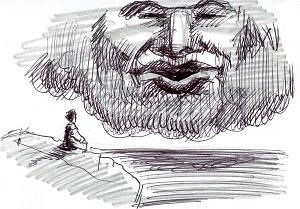

“All this I do for the sake of the gospel, so that I too may have a share in it” (1 Cor 9:23).
Job 7:1-4, 6-7; Ps 147; 1 Cor 9:16-19, 22-23; Mark 1:29-39
Fifth Sunday in Ordinary Time
From the Book of Job to the novels of Dostoevsky, the question of why the innocent suffer has been the most direct challenge to the power and goodness of God. The argument goes like this: If God can’t stop evil, God is not all powerful and therefore not God. If God can stop it but does not, God is a monster.
The author of Job posed the argument in story form, presenting a demonstrably just man who is afflicted in every way imaginable. Three interlocutors representing the common explanations of philosophy and religion argue that Job must be guilty of something, otherwise the moral universe and God are out of control, human virtue or vice are irrelevant and life is a meaningless freefall into chaos. The question is posed so convincingly that God can only claim to be a mystery so immense and ineffable that no one can question or hold him accountable by human standards.
The 1981 bestseller When Bad Things Happen to Good People by Rabbi Harold Kushner restated the problem of Job to emphasize that undeserved suffering is meaningful or meaningless depending on how we respond to it. Author Jack Miles wrote two books, GOD: A Biography (1995), and CHRIST: A Crisis in the Life of God (2001), in which he examined God as a literary character who loses the argument with Job and goes silent, then enters history in the person of Jesus to take personal responsibility for the problem of good and evil in the world.
Today’s readings invite us to take up this conundrum. We meet Job in despair over the pointlessness of his life, left hanging in the wind with no hope of ever seeing happiness again. In the Gospel, however, we witness Jesus at full power, healing the sick and driving out evil spirits. But lest we imagine that he is eradicating all suffering forever, we quickly grasp that Jesus’ physical miracles are only temporary and that his deeper mission is to confront evil and overcome death by embracing them on the cross, accepting universal human suffering himself to open the way to eternal life after natural death.
The challenge for us is in the details because suffering and death still prevail in this world and whether a moral balance is affirmed after death is a question of faith. Human beings are born into a world of choice, chance and circumstance and some survive only briefly facing inexplicable illness, deprivation and suffering while others live long, productive and enjoyable lives until age, illness and death claim them as well. The answer to Job’s question and ours is how we face this mystery.
Jesus embraced human existence, suffering and death, and he taught and demonstrated that love unites us with God so intimately that whatever happens to us, we will know friendship with God both here and for all eternity. Whether or not we find this believable, we have a lifetime to live as Jesus did and an eternity to ask God all our questions.
Advertisement








